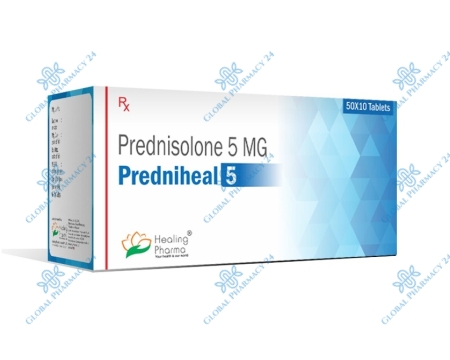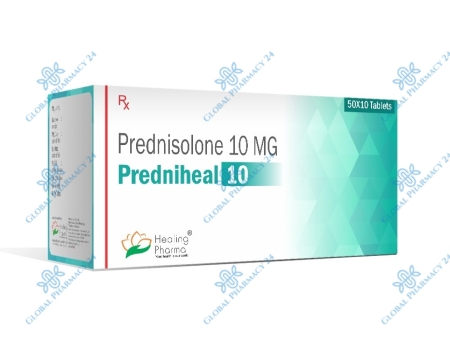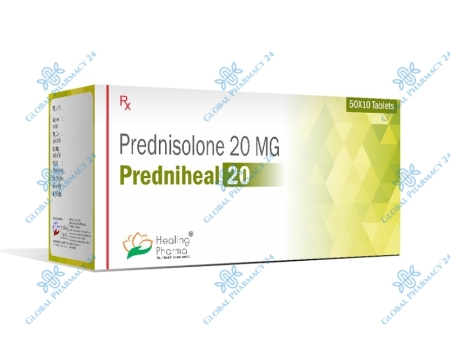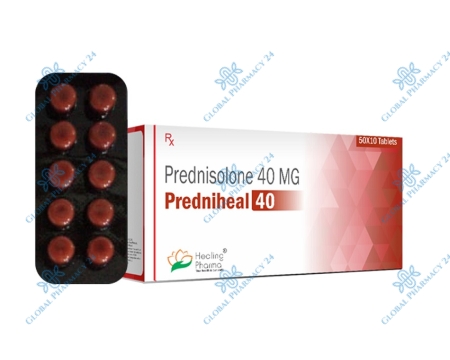| Characteristic | Detail |
|---|---|
| Active Ingredient | Prednisolone |
| Dosage Forms | Tablets, Oral Solution, Injectable |
| Common Dosage | Varies by condition: 5mg to 60mg daily |
| Duration of Effect | 12-36 hours, depending on dose |
| Main Uses | Anti-inflammatory, Immunosuppressant |
Understanding Prednisolone
Prednisolone is a synthetic glucocorticoid with potent anti-inflammatory and immunosuppressive properties. It is widely used in the treatment of various conditions, including autoimmune diseases, allergic reactions, and certain types of cancer. Prednisolone mimics the action of cortisol, a naturally occurring hormone produced by the adrenal glands, playing a critical role in regulating the body's stress response, metabolism, and immune system.
Its versatility in addressing a broad spectrum of medical conditions makes prednisolone a staple in the pharmaceutical arsenal. However, its efficacy must be balanced with an understanding of its potential side effects and the necessity for careful dosage regulation. Patients and healthcare providers must work closely to optimize therapeutic outcomes while minimizing risks.
The Science Behind Prednisolone
Prednisolone's effectiveness stems from its ability to modulate the immune system and reduce inflammation. It achieves these effects by entering cells and binding to glucocorticoid receptors, altering gene expression and suppressing the activities of inflammatory cells and substances. This mechanism underlies its wide-ranging applications in medical treatments.
Exploring the Chemical Structure of Prednisolone
The chemical structure of prednisolone is characterized by a corticosteroid backbone, which is crucial for its activity. This structure allows it to easily cross cell membranes and exert its anti-inflammatory effects at the molecular level.
How Prednisolone Works in the Body
Once inside the body, prednisolone interacts with specific receptor proteins to inhibit the immune response and reduce inflammation. Its ability to suppress the production of substances that trigger allergic and inflammatory actions makes it effective in managing symptoms of various conditions.
Prednisolone and Human Health
Prednisolone's impact on human health is significant, offering relief from chronic and acute conditions. By mimicking cortisol, it helps manage conditions that arise from an overactive immune system, such as lupus, rheumatoid arthritis, and asthma, enhancing patients' quality of life.
Prednisolone's Role in Glucocorticoid and Mineralocorticoid Actions
While primarily acting as a glucocorticoid, prednisolone also has some mineralocorticoid activity, affecting electrolyte and water balance, although to a lesser extent. Its glucocorticoid action is more pronounced, focusing on reducing inflammation and modulating the immune response.
The Relationship Between Prednisolone and Kidney Health
Prednisolone's effects on kidney health are generally positive, particularly in reducing inflammation in conditions like nephrotic syndrome. However, long-term use requires monitoring to prevent potential complications.
Precautionary Measures for Prednisolone
While prednisolone is a powerful medication, its use comes with the need for precautionary measures. Patients should be aware of contraindications, potential risks, and the importance of adherence to prescribed dosages to ensure safety and effectiveness.
Contraindications and Potential Risks
Prednisolone is contraindicated in patients with systemic fungal infections and those with known hypersensitivity to the drug. Potential risks include immune system suppression, increased risk of infections, and possible adrenal insufficiency with long-term use.
Things to Keep in Mind When Using Prednisolone
When using prednisolone, it's essential to monitor for side effects, adjust dosages as necessary, and consider interactions with other medications. Patients should also be aware of the potential for adrenal suppression and the need for gradual dose reduction when discontinuing therapy.
The Right Way to Use Prednisolone
Proper use of prednisolone involves understanding the correct dosages, administration methods, and the importance of adhering to prescribed treatment plans. Given its potent effects, tailoring the therapy to the individual's specific needs while considering their overall health status is crucial for achieving optimal outcomes.
Prednisolone's administration varies from oral to injectable forms, depending on the condition being treated and the patient's specific requirements. It's important for patients to follow their healthcare provider's instructions closely, including any dietary restrictions or adjustments in dosage based on the response to treatment and side effect profile.
Dosage and Administration of Prednisolone
The dosage and administration of prednisolone vary widely depending on the condition being treated and the individual patient's response. Healthcare providers will determine the most appropriate form and dosage to effectively manage the condition while minimizing potential side effects.
Navigating Oral Therapy and Pulse Therapy
Oral therapy with prednisolone is common for many conditions, with dosages adjusted based on therapeutic response and side effects. Pulse therapy, involving high doses for short periods, may be used for acute exacerbations of chronic conditions.
Understanding the Dosage Guidelines for Prednisolone
Dosage guidelines for prednisolone are determined by the severity of the condition and the patient's medical history. Initial high doses may be required, with gradual tapering to the lowest effective dose to manage the condition.
How to Manage Chronic Diseases While on Prednisolone
Managing chronic diseases while on prednisolone requires careful monitoring of the condition and potential side effects of the medication. Healthcare providers may adjust dosages or recommend additional treatments to manage these risks effectively.
Interactions Between Prednisolone and Other Medicines
Prednisolone can interact with a wide range of medications, potentially altering their effects. Patients should inform their healthcare providers about all medications they are taking to avoid adverse interactions.
Living with Prednisolone
Living with prednisolone as a long-term treatment requires adjustments and understanding. Patients must be aware of how it affects vaccinations, the necessity of regular medical supervision, and strategies for safely discontinuing the medication.
The Impact of Prednisolone on Vaccinations
Prednisolone can affect the immune system's response to vaccinations. Patients may need to adjust vaccination schedules or take special precautions based on their healthcare provider's advice.
Steps to Safely Discontinue Prednisolone
Discontinuing prednisolone must be done gradually to avoid withdrawal symptoms and adrenal insufficiency. A healthcare provider will outline a tapering schedule that safely reduces the dosage over time.
Dealing with Prednisolone Side Effects
Prednisolone, while highly effective, can cause a range of side effects, from mild to severe. Understanding these side effects and how to manage them is crucial for patients undergoing treatment. Healthcare providers play a key role in monitoring for adverse effects and making necessary adjustments to therapy.
The potential side effects of prednisolone span both physical and psychological aspects, necessitating a comprehensive approach to monitoring and management. Patients should be encouraged to report any new or worsening symptoms to their healthcare provider promptly.
Potential Side Effects of Prednisolone
Prednisolone's side effects can vary widely among individuals, encompassing both short-term and long-term health implications. Awareness and early management of these side effects can significantly improve patient outcomes and comfort.
An Overview of Short-term and Long-term Side Effects
Short-term side effects of prednisolone may include increased appetite, weight gain, and mood changes, while long-term use can lead to more serious conditions such as osteoporosis, diabetes, and increased risk of infection.
The Physical and Psychological Effects of Prednisolone
The physical and psychological effects of prednisolone require careful monitoring. Physical effects can range from easy bruising to high blood pressure, while psychological effects may include mood swings, anxiety, and depression.
Managing Prednisolone Side Effects
Effective management of prednisolone side effects involves a combination of medication adjustment, lifestyle changes, and supportive therapies. Patients and healthcare providers should work together to mitigate these effects while continuing to treat the underlying condition.
Coping Strategies for Side Effects
Coping strategies for dealing with the side effects of prednisolone include dietary modifications, exercise, and mental health support. These strategies can help manage weight gain, mood changes, and other adverse effects.
When to Seek Help for Prednisolone Side Effects
It's important for patients to know when to seek help for side effects of prednisolone. Any severe or persistent symptoms should be reported to a healthcare provider immediately to prevent further complications.
The Cost Factor of Prednisolone
The cost of prednisolone can vary significantly depending on the dosage, form, and whether the brand name or generic version is purchased. Understanding these cost factors is important for patients and healthcare providers when considering treatment options.
Financial considerations play a crucial role in treatment accessibility and adherence. Patients should explore coverage options through insurance, government programs, or patient assistance programs to mitigate the financial impact of their treatment.
Understanding the Price of Prednisolone
The price of prednisolone can be influenced by several factors, including insurance coverage, pharmacy pricing, and availability of generic versions. Patients should discuss these factors with their healthcare provider to find the most cost-effective treatment plan.
Generic vs Brand Name Prednisolone: A Price Comparison
Generic versions of prednisolone offer a more affordable alternative to the brand name drug without sacrificing effectiveness. Price comparisons between generic and brand name versions can help patients make informed decisions about their treatment.
Coverage and Financial Assistance for Prednisolone
Many insurance plans cover prednisolone, but coverage levels and out-of-pocket costs can vary. Financial assistance programs and discounts may also be available to help reduce the cost of prednisolone for eligible patients.
FAQs Prednisolone
What is Prednisolone used for?
Prednisolone is a corticosteroid medication used to treat a variety of conditions such as allergies, asthma, arthritis, autoimmune diseases, skin conditions, and certain types of cancer.
How does Prednisolone work?
Prednisolone works by reducing inflammation and suppressing the immune system, which helps to alleviate symptoms associated with various conditions.
What are the common side effects of Prednisolone?
Common side effects of Prednisolone include increased appetite, weight gain, fluid retention, mood changes, insomnia, and gastrointestinal symptoms such as stomach upset or ulcers.
Can Prednisolone be taken with other medications?
It's important to consult with a healthcare professional before taking Prednisolone with other medications, as it may interact with certain drugs and affect their effectiveness or increase the risk of side effects.
How is Prednisolone typically administered?
Prednisolone can be taken orally in the form of tablets or liquid suspension. It may also be administered through injection depending on the condition being treated and the severity of symptoms.
Is Prednisolone safe for long-term use?
Long-term use of Prednisolone may increase the risk of certain side effects such as osteoporosis, cataracts, and adrenal suppression. It's important to use Prednisolone as directed by a healthcare professional and to regularly monitor for any adverse effects.
Can Prednisolone be used during pregnancy or while breastfeeding?
It's essential to consult with a healthcare provider before using Prednisolone during pregnancy or breastfeeding, as it may pose risks to the fetus or nursing infant. In some cases, the benefits of treatment may outweigh the potential risks, but this should be carefully evaluated by a medical professional.























